Your purchase contributes to saving pets – $1.00 of each product sold is donated.
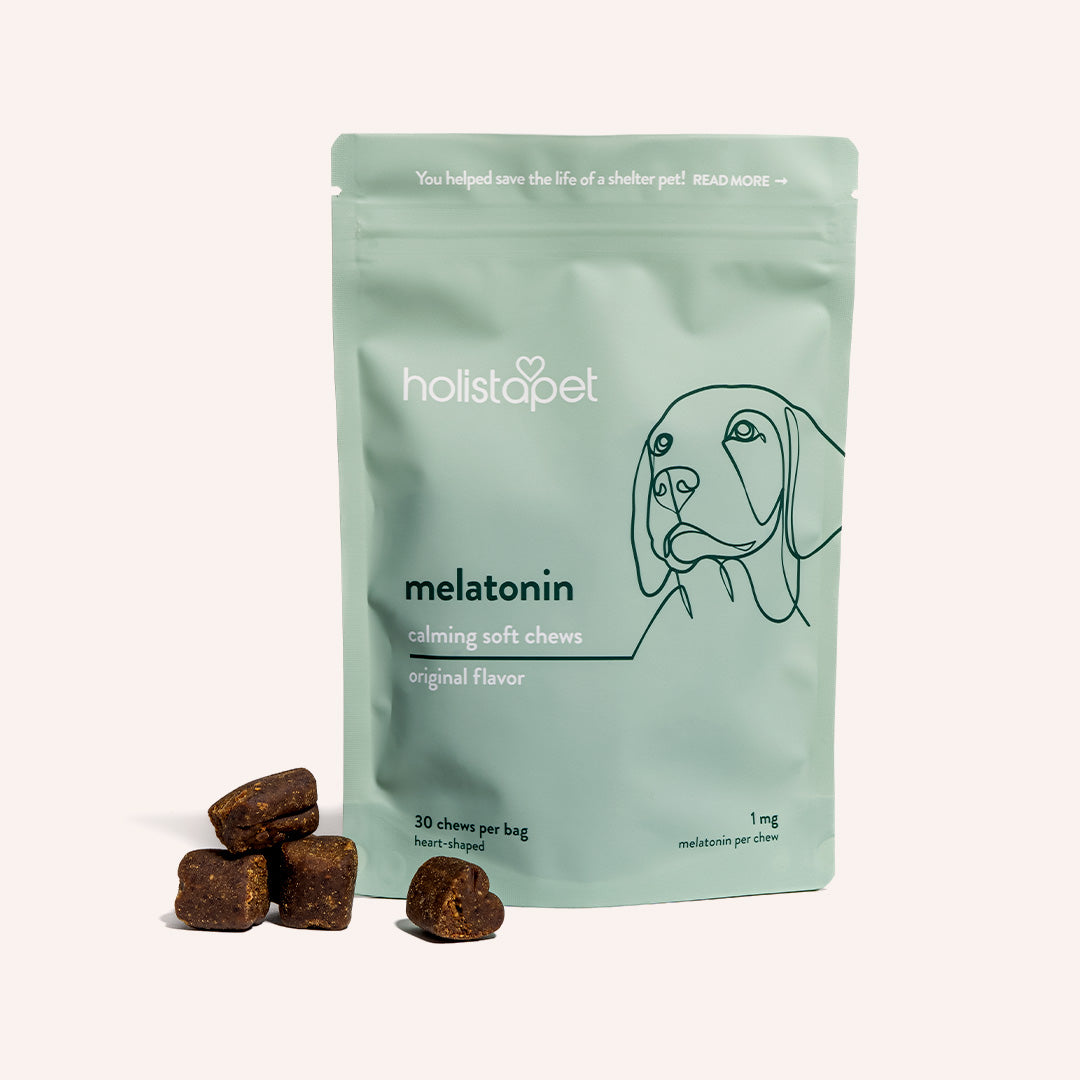

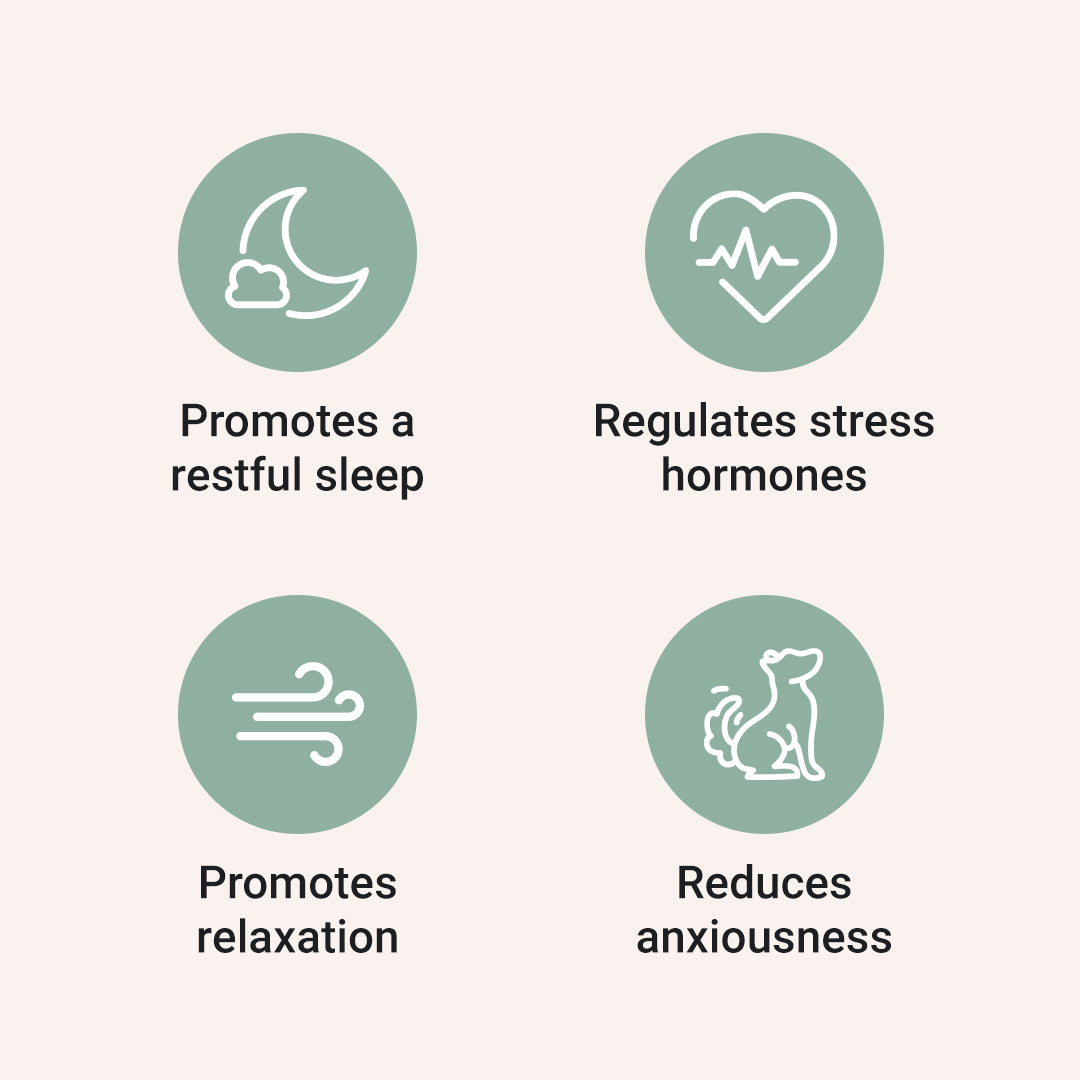
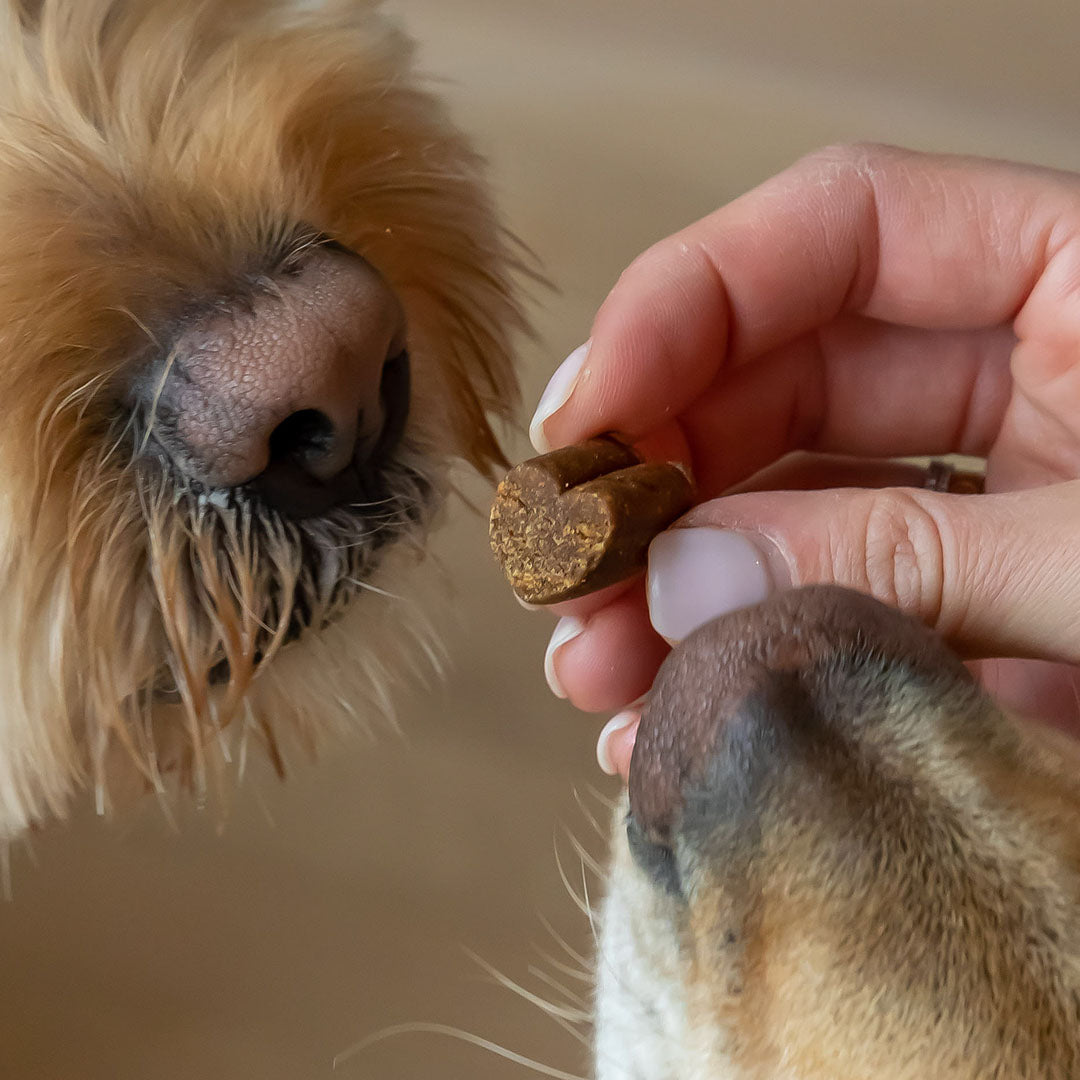
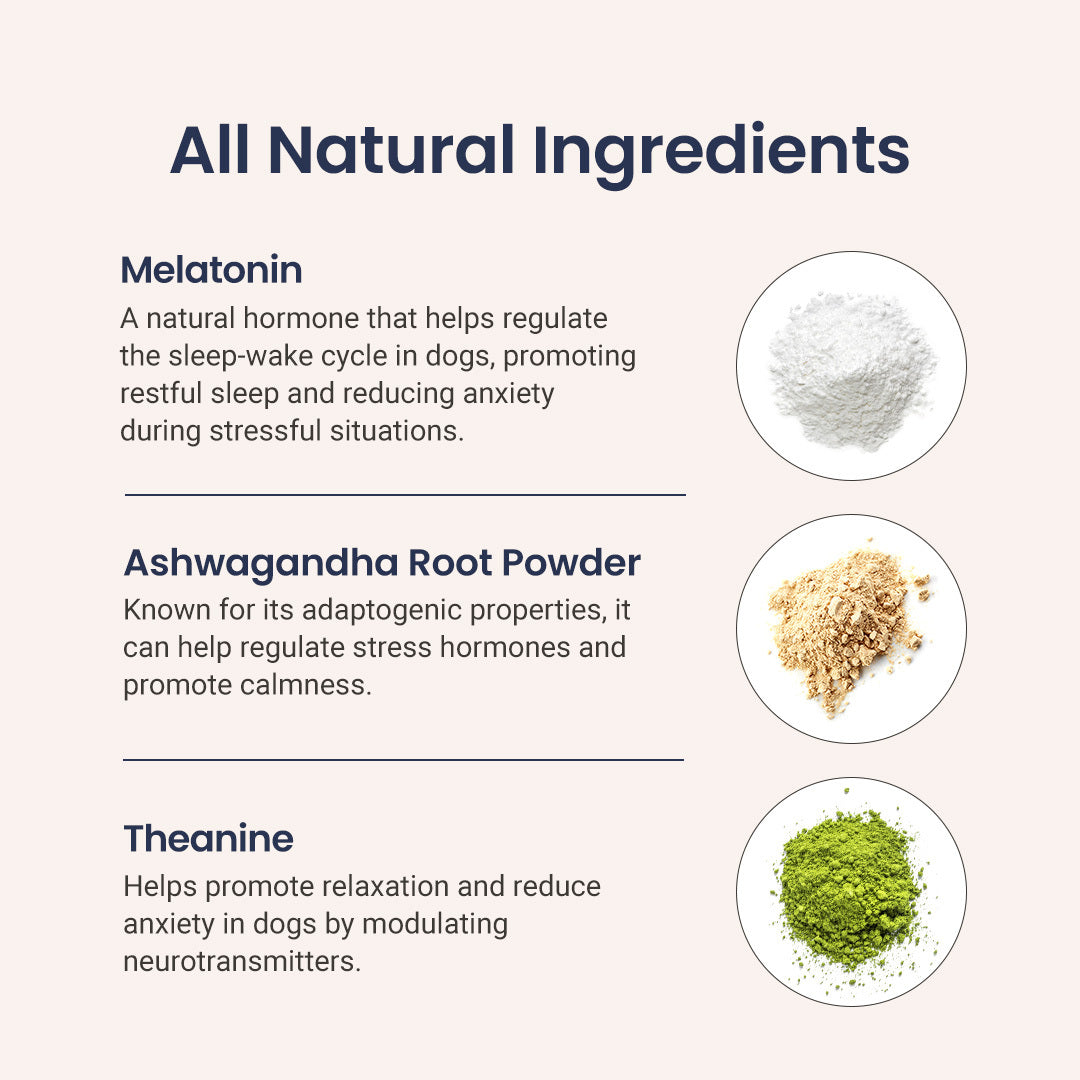
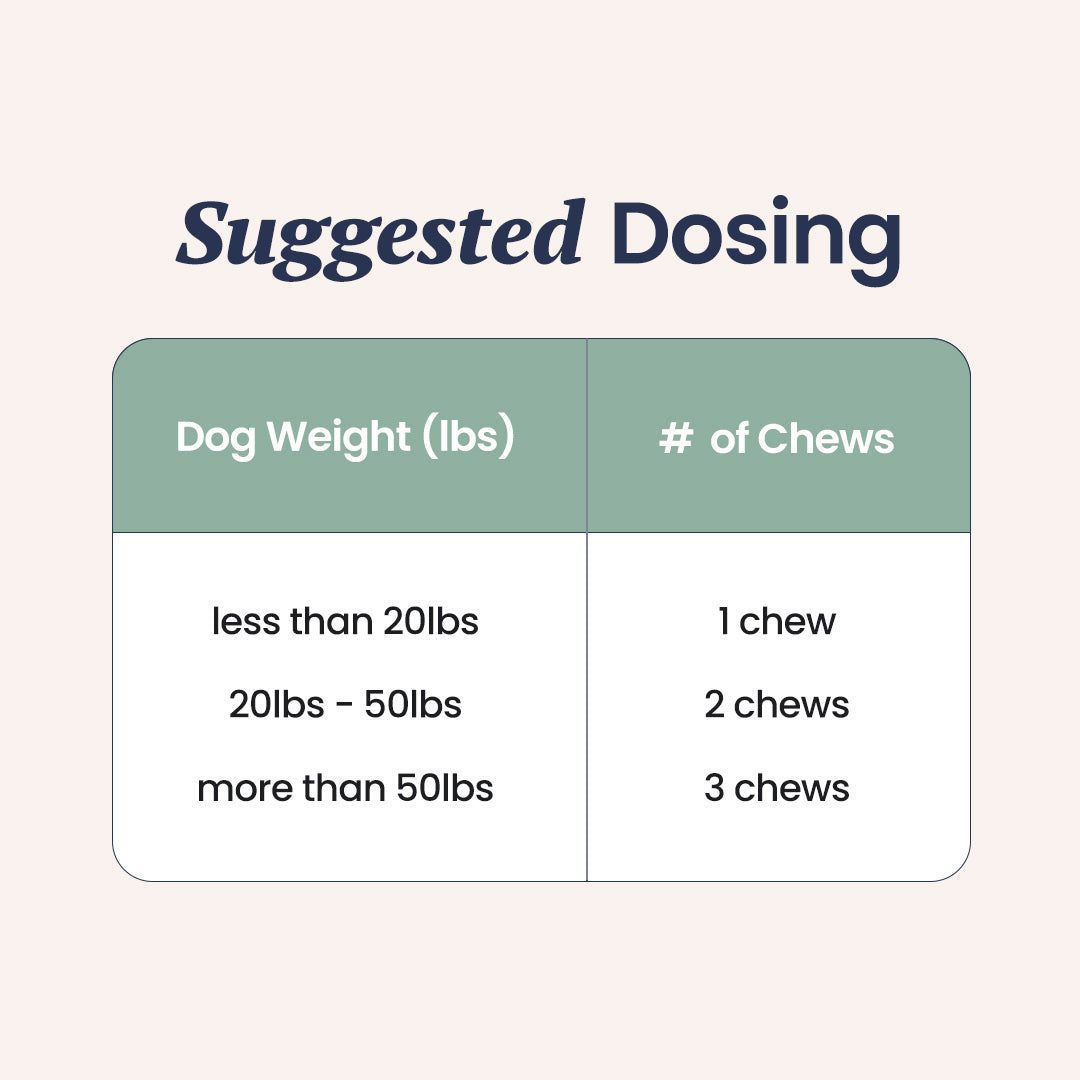
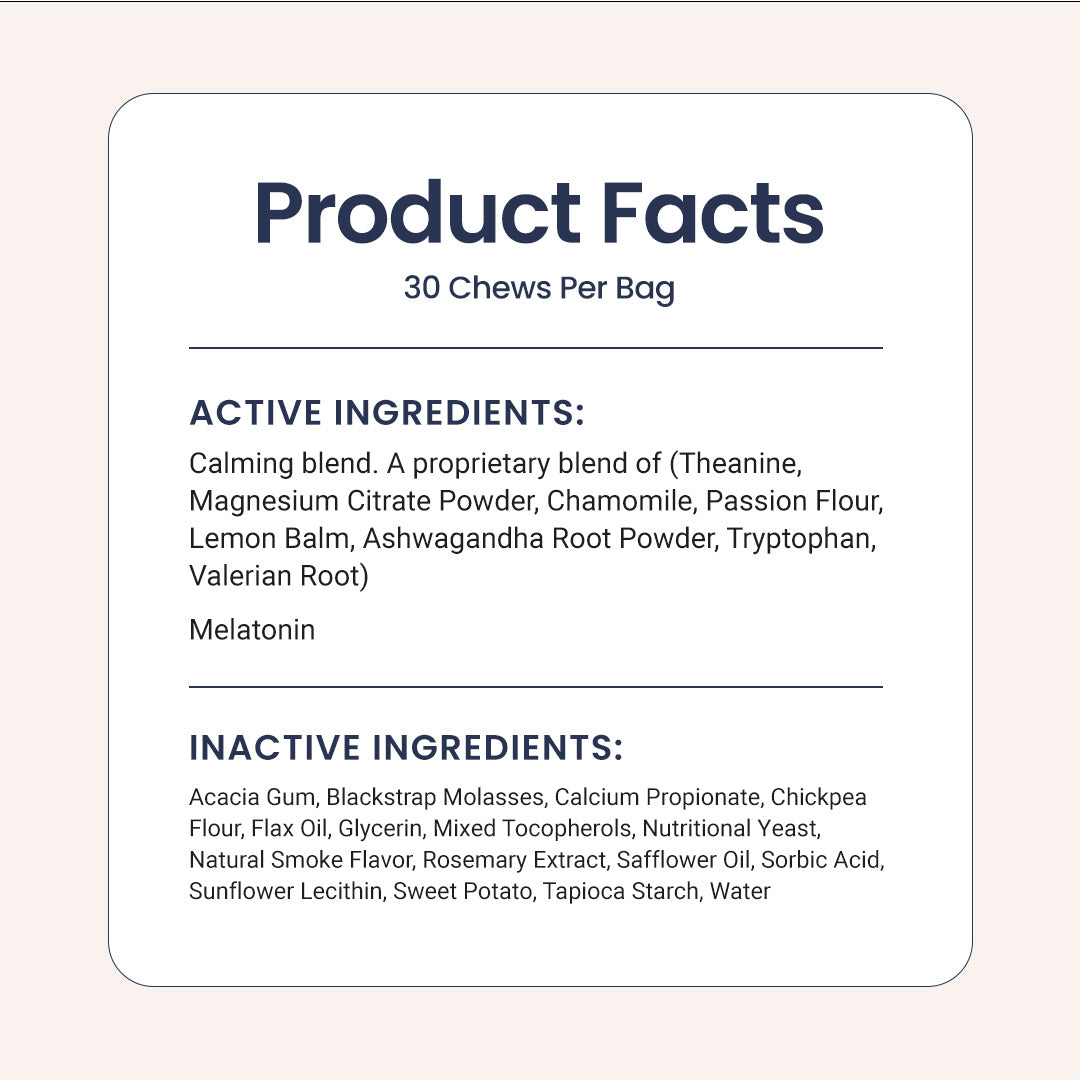
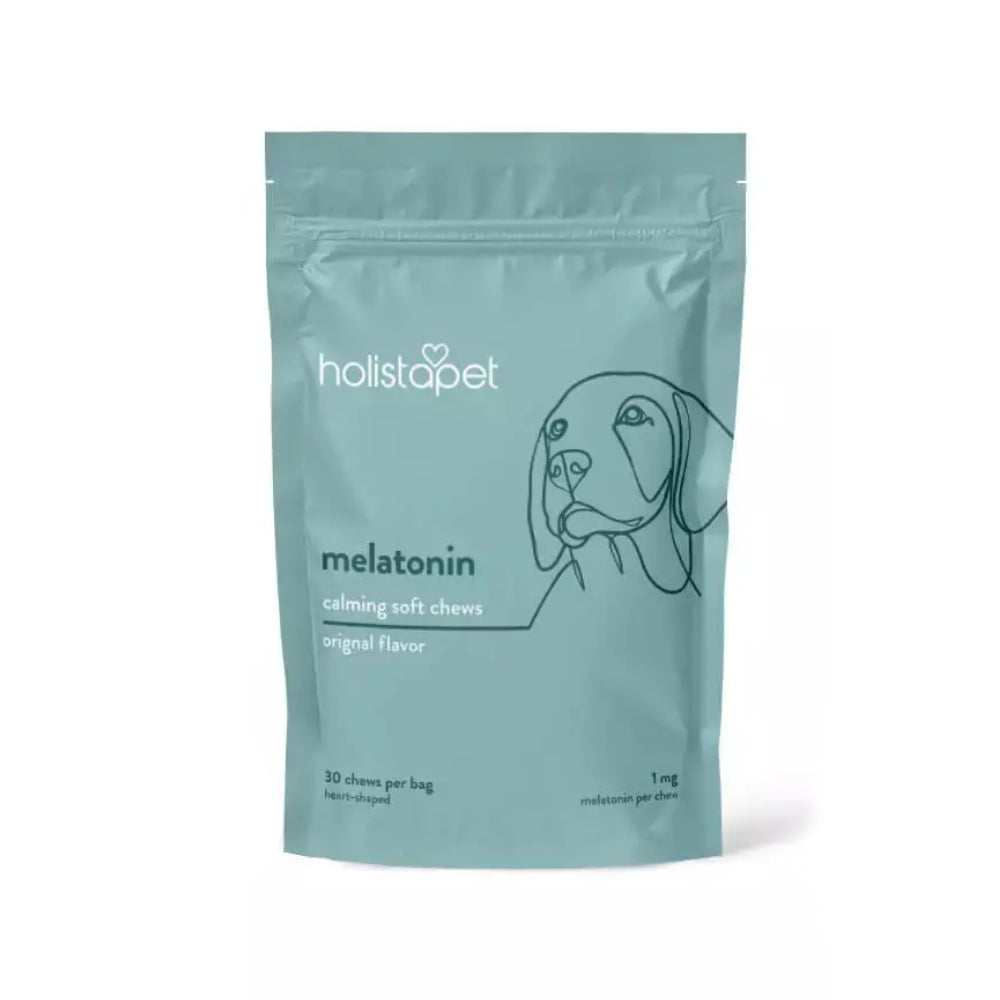
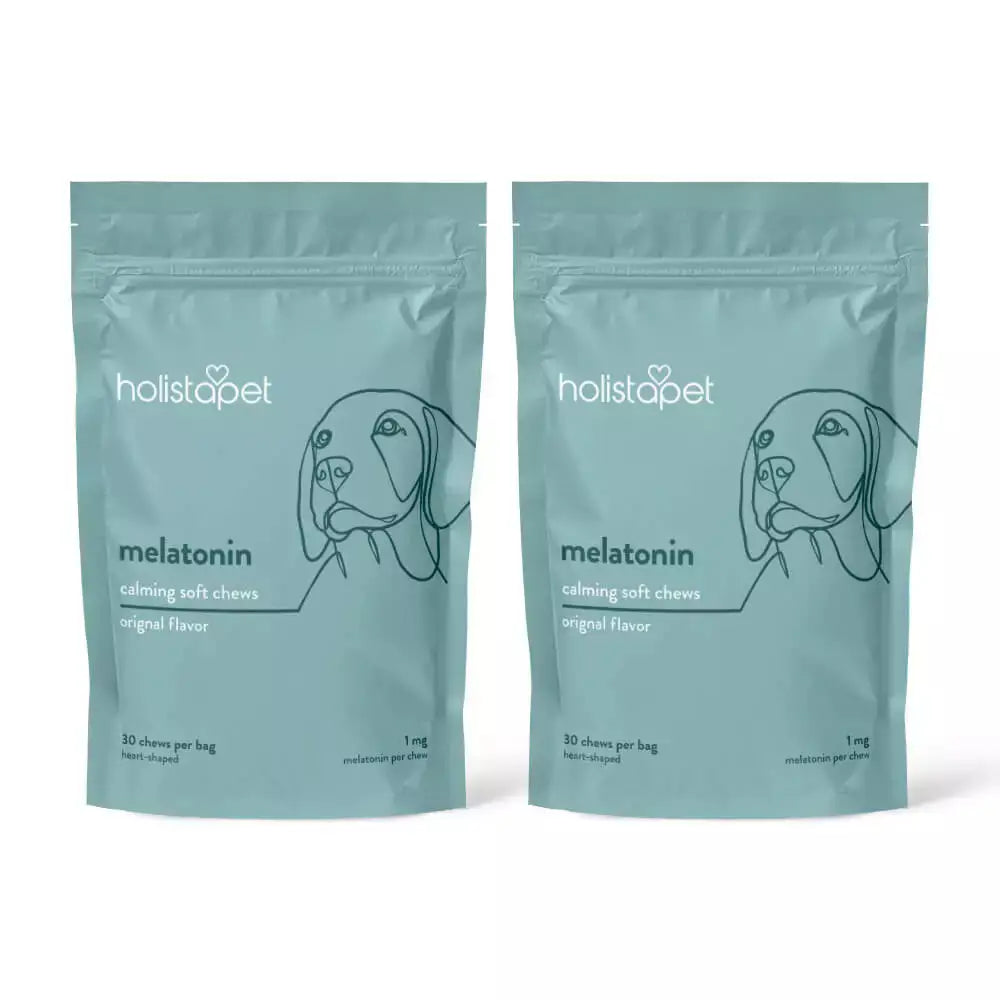
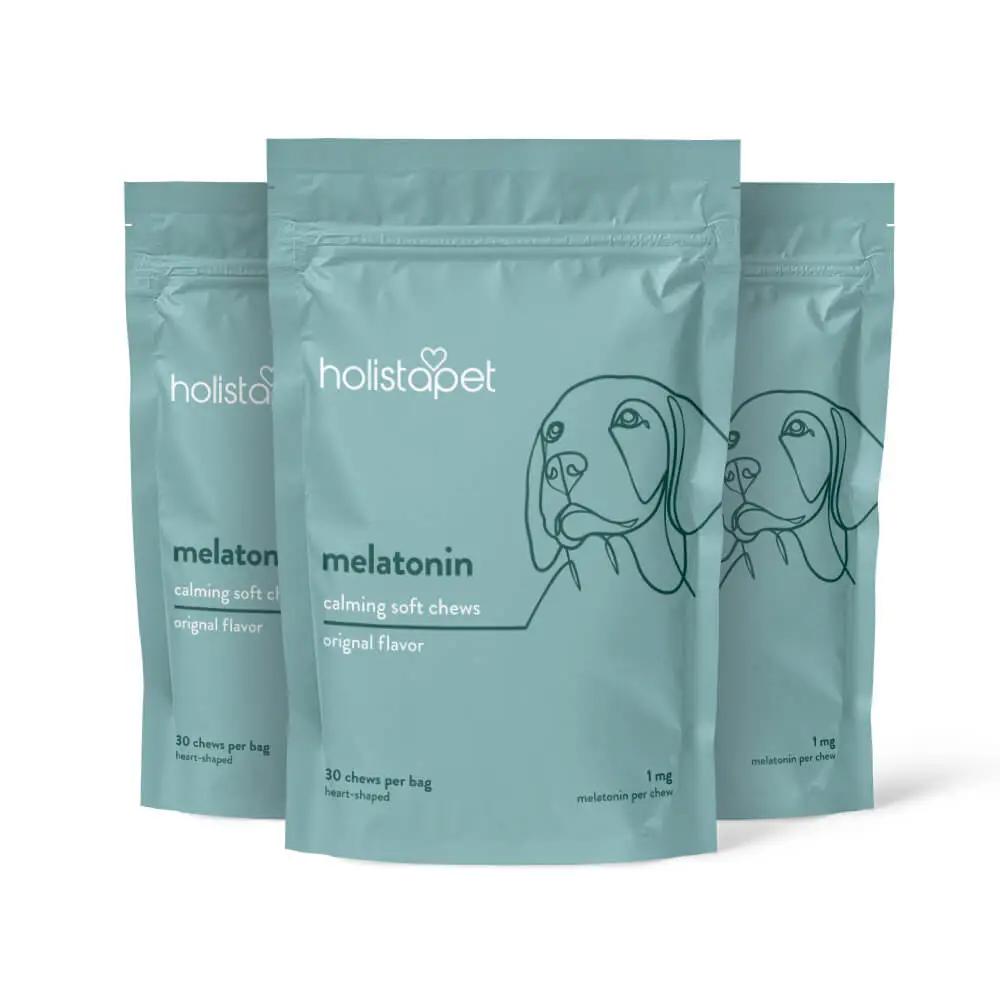
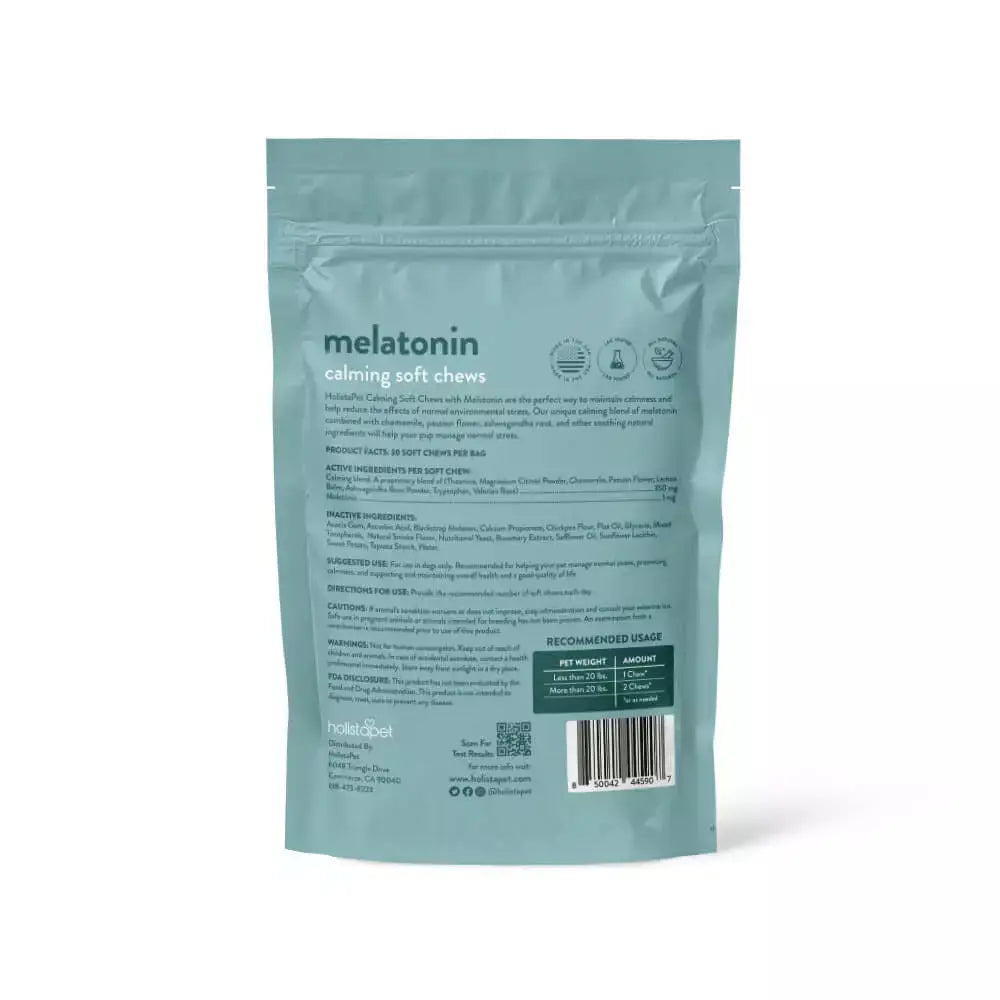

Melatonin for Dogs
Made from natural ingredients, our Melatonin Soft Chews feature a proprietary blend of calming ingredients like L-theanine, chamomile, passion flower, ashwagandha, tryptophan, valerian root, and more. Our chews help reduce anxiousness and promote relaxation in your dog. These treats offer a natural way to keep your pup calm, cool, and collected, easing their mind and body while supporting better sleep. Each bag contains 30 treats that your pup will love!
Benefits
Benefits
- 100% all-natural ingredients
- Reduces anxiousness and promotes relaxation for your dog
- Natural way to keep your pup calm, cool, and collected
- Helps ease their mind and body for sleep regulation
- 30 chews per bag
- Propietary blend of L-theanine, chamomile, passion flower, ashwagandha, trytophan, valerian root, and other calming ingredients.
Serving Size
Serving Size
- Less than 20 lbs = 1 chew*
- 20-50 lbs = 2 chews*
- More than 50 lbs = 3 chews*
*or as needed
Unlock your full potential with HolistaPet by joining our club today - offering the most substantial discounts and exceptional rewards, all for just $95.
- 30% off every order
- 2X rewards points
- FREE shipping on all orders
- Exclusive special offers
- We donate 10% of your membership fee to help save the lives of shelter animals
Join HolistaPals

Melatonin Soft Chews for Dogs
Administering melatonin to your canine companion is one of the most straightforward ways to enhance their health and tranquility. Melatonin for dogs may help them enjoy a fuller, more peaceful life by promoting better sleep, calming anxiousness, and supporting a positive mood, among other benefits.
Melatonin is a naturally occurring hormone mainly produced in the pineal gland in the brain. It helps people sleep well and can be beneficial for dogs, too. You might wonder, "Is melatonin safe for dogs, and how much should they take?" We hear you.
Read along as we discuss the different benefits, appropriate dose, potential side effects, and everything else you need to know before adding melatonin to your dog's routine. If you're looking for the best melatonin option for dogs, click the button below.
Buy Melatonin Soft ChewsEffects Of Melatonin for Dogs
Effects Of Melatonin for Dogs
When you give a dog melatonin supplement, it mainly helps them chill out and get better sleep. Most dogs handle melatonin just fine without any adverse effects, but some might feel a bit sleepy or experience discomfort in their tummy.
The cool part is melatonin gets to work fairly quickly, usually in about an hour or so. This means timing the dose right can help your dog stay calm through frightening situations.
Remember, every dog is different. What works for a specific dog might not work for another. That's why observing your furry pal after they take melatonin for the first time is a must.
What Is Melatonin Used for in Dogs? [Benefits]
What Is Melatonin Used for in Dogs? [Benefits]
Melatonin is like a Swiss Army knife for dogs' health issues — it's got a lot of uses! We'll go over them in detail, but here is a quick overview:
- For Stress and Anxiety. Melatonin helps calm dogs down. If you've got a dog who gets super anxious during fireworks, storms, or even seasonal changes, melatonin can help soothe their nerves.
- For Fear and Phobias. Melatonin offers a comforting effect, easing the fear that grips dogs in unsettling situations. It acts like a gentle hug for their nervous system, making the world seem a little less daunting.
- For Sleep Issues. Some dogs have trouble sleeping through the night for various reasons, like sleep problems, health issues, or anxious behaviors. If your furry pal is the same, giving melatonin can help your dog sleep.
- Other Uses. Melatonin can aid in hair growth and make your dog's fur grow back after hair loss. This is especially helpful for dogs with skin problems.
Melatonin for Stress and Anxiousness
Melatonin plays a role in managing the hormone cortisol. Cortisol is responsible for stress levels in dogs. For dogs that turn into a bundle of nerves at the drop of a hat — think thunderstorms, vet visits, or even when you're heading out the door — melatonin might be the chill pill they need.
When dogs get anxious, their bodies can get all wired up like they're ready to run a marathon. Melatonin steps in to turn down the dial on that feeling, helping them relax without needing heavy-duty medications.
But here's the kicker: While melatonin is generally great at helping dogs cope with agitation and anxious behaviors, it's not a one-size-fits-all deal. Some dogs might feel calm right away, while others might not show as much of a change.
Melatonin for Fear and Phobias
By calming their mind, melatonin can help your dog feel less overwhelmed when facing their biggest fears. Think of melatonin as a superhero for dogs with fears and phobias. It doesn't make the scary stuff disappear, but it helps your dog deal with it better.
Pro tip: Melatonin works best when you combine it with other things like a cozy space for your dog to chill out in, some positive reinforcement (think treats and cuddles), and sometimes even a bit of training to help them cope with their fears better.
Melatonin for Sleep Issues in Dogs
Melatonin helps regulate sleep-wake cycles in dogs, helping dogs sleep better through the night. It's like a gentle nudge to a dog's internal clock, helping them understand that nighttime is for sleeping, not for play or worry.
Melatonin works by syncing up with your dog's natural sleep cycle. It's like telling their body, "Hey, it's dark out; it's time to wind down and get some rest." This can be super helpful for older dogs who might get their days and nights mixed up or puppies dealing with changes in their routine.
Other Uses of Melatonin in Dogs
Melatonin has a couple more tricks up its sleeve. For example, melatonin for dogs may support hair growth when they experience their fur falling out in patches because of skin conditions.
But wait, there’s more! Melatonin also has the potential to help with conditions like Cushing's disease, which affects how the body produces hormones. While it’s not a cure, it may help soothe some of the symptoms and make your pet feel more comfortable.
Is Melatonin Safe for Dogs?
Is Melatonin Safe for Dogs?
Yes, melatonin is absolutely safe for dogs! Melatonin helps regulate sleep and wakefulness and is naturally produced by your dog’s body. It’s also available over-the-counter for both animals and humans in many countries. When taken as directed, melatonin is generally safe for dogs.
Like with any supplement, it's advised to chat with your veterinarian first. They can give you the green light and guide you on the proper dosage based on your dog's weight, size, age, and health condition.


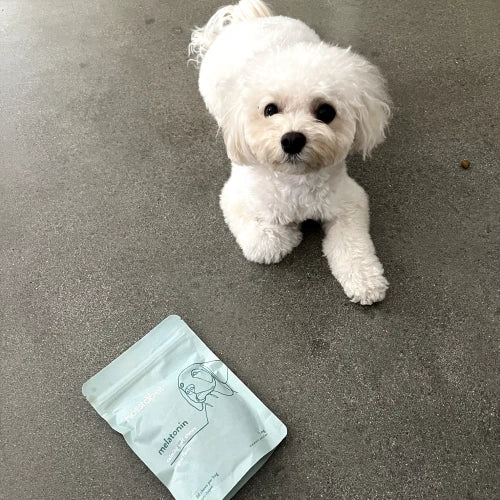
Has been donated since the 2023 launch of HolistaPet Helps!
How Do I Know If My Dog Needs Melatonin?
If your dog is experiencing anxiety or stress, melatonin may be a helpful addition to your pup’s wellness regimen. Melatonin is a naturally occurring hormone that helps regulate sleep. Giving your dog melatonin will help them stay relaxed, even during the most stressful situations.
Ingredients
Ingredients
Active Ingredients:
- Theanine – 100 mg
- Magnesium Citrate Powder – 50 mg
- Chamomile – 50 mg
- Passion Flower – 50 mg
- Lemon Balm – 25 mg
- Ashwagandha Root Powder – 25 mg
- Tryptophan – 25 mg
- Valerian Root – 25 mg
- Melatonin – 1 mg
Inactive Ingredients: Acacia Gum, Blackstrap Molasses, Calcium Propionate, Chickpea Flour, Flax Oil, Glycerin, Mixed Tocopherols, Nutritional Yeast, Natural Smoke Flavor, Rosemary Extract, Safflower Oil, Sorbic Acid, Sunflower Lecithin, Sweet Potato, Tapioca Starch, Water.
Directions For Use
Directions For Use
We recommend you give your dog our Calming Melatonin Soft Chews once a day or as needed. Here are the recommended serving suggestions based on your dog’s weight:
- Under 20 pounds = 1 chew
- Over 20 pounds = 2 chews
How Much Melatonin Should I Give My Dog?
How Much Melatonin Should I Give My Dog?
As a general rule, most veterinary professionals recommend giving dogs between 1-3 mg of melatonin per pound of body weight. However, this amount can differ between dogs based on a variety of factors, like tolerance, diet, age, and more.
However, our Calming Melatonin Soft Chews are made with a unique proprietary formula of naturally relaxing ingredients, meaning your dog will receive just the right amount of melatonin to keep them relaxed without being overwhelmed.
When To Give Your Dog Melatonin
When To Give Your Dog Melatonin
Since melatonin isn't a daily vitamin, it's best used for specific situations rather than a regular part of their diet. Figuring out the perfect time to give your dog melatonin is key to ensuring it does its job right. Timing can make a big difference, especially if you're using it to calm them down or help them sleep.
If your dog gets jittery during fireworks or storms, give them melatonin about an hour before you expect the noise to start. This way, it kicks in just in time to keep them calm. For sleep disorders, giving melatonin to your dog about 30 minutes to an hour before their bedtime can help them drift off to dreamland more smoothly.
How Long Does It Take for Melatonin To Start Working?
How Long Does It Take for Melatonin To Start Working?
Generally, melatonin supplements start working within about an hour of taking it. This timing is perfect for preparing your dog for scary events or helping them settle down for the night.
However, every dog is different. Some might start feeling more relaxed and ready to sleep quicker, while others might take a bit longer. For best results, time the melatonin dose so that it has a chance to start working when your dog really needs it.
How Long Do The Effects Last?
How Long Do The Effects Last?
Typically, melatonin stays active in a dog's system for about 8 to 12 hours. That's a good stretch of time, especially if you're using it to help your dog get a full night's sleep or stay calm during a day when you know there'll be lots of noise or agitation.
But, just like how different foods can digest at different speeds in people, how long melatonin lasts can vary from one dog to another. It depends on their size, activity level, and overall health. Some dogs might shake it off quicker and return to their energetic selves in no time, while others might be in chill mode a bit longer.
So keep an eye on your dog the first few times they take melatonin. You'll get a feel for how it affects them specifically, including how quickly it starts working and how long it keeps them calm or sleepy.
Choosing the Best Melatonin Supplements for Your Dog
Choosing the Best Melatonin Supplements for Your Dog
Now that you know more about melatonin, you might be ready to start choosing the best product for your pet. Look no further. Our melatonin soft chews are crafted with a unique blend of natural calming agents, such as L-theanine, chamomile, passion flower, ashwagandha, tryptophan, and valerian root. Use them to soothe anxiety and promote relaxation effectively.
Our treats are designed to keep your dog calm and support better sleep, making them an ideal choice for managing your pet's stress and restlessness. Here are some additional tips to help you choose the best melatonin supplement for your furry pal:
- Look for Dog-Specific Products. Always choose melatonin products made for dogs, just like ours, instead of human supplements. The latter may contain harmful additives like xylitol.
- Check the Ingredients. Look for those with safe active ingredients, and keep an eye out for those that might not be good for your dog. If you're unsure about an ingredient, a quick call to your veterinarian can clarify things.
- Consider Your Dog's Preferences. Knowing what form of melatonin will be easiest for you to administer and for your dog to take can save you both a lot of trouble. For example, you might find our Melatonin Soft Chews to be a tasty and good choice.
- Read Reviews. Seeing what has worked well for other dogs can give you a good starting point, especially when choosing between a few different products.
- Start Small. Start with the smallest dose recommended by your vet and see how your dog reacts. You can adjust from there based on their needs.
- Talk to Your Vet. When considering new supplements like melatonin, getting advice from your veterinarian can be useful. They know your dog's health inside and out and can recommend the best type and dose of melatonin.
What Type of Melatonin Dog Products Are There?
What Type of Melatonin Dog Products Are There?
Melatonin is available as an over-the-counter supplement specifically designed for dogs. We offer the best melatonin soft treats available, but if you're looking for something else, there are a couple of different options out there. Here's a rundown of other options:
- Soft Chews. Many dogs think of these as just another treat. They're pre-dosed, so you know exactly how much melatonin your dog gets each time.
- Tablets and Pills. They're easy to measure for dosing, but some dogs might not be fans of swallowing them. You can always hide the pill in a treat or a bit of their favorite food to make it easier.
- Liquid Melatonin. This form is great for dogs who don't like pills. You can mix it right into their food or water, making it easy to give.
- Melatonin Implants. These are less common but can be an option for long-term use. A vet places a small implant under your dog's skin, and it releases melatonin slowly over time.
Can Dogs Have Too Much Melatonin?
Can Dogs Have Too Much Melatonin?
Overdosing on melatonin in dogs is rare, but it's still something to be aware of to keep your dog safe. The good news is that melatonin has a pretty high safety margin. But like anything, there's a limit to how much dogs should take.
If a dog takes too much melatonin, they might get really sleepy or have an upset stomach. These signs aren't usually dangerous, but they're definitely not comfortable for your dog.
In more serious cases, an overdose could cause more severe issues like a super high heart rate, confusion, or even seizures. These, however, are pretty rare.
To avoid an overdose, stick to the dose your vet recommends and keep the entire bottle of melatonin out of your dog's reach. Dogs are naturally curious and might see a bottle as a fun chew toy, leading to them getting way more than they need.
Are There Any Potential Side Effects?
Are There Any Potential Side Effects?
Like any supplement, melatonin can have side effects, although they're pretty rare when you stick to the right dose for your dog. Being aware of possible melatonin side effects will help you keep your dog safe and comfortable.
The most common side effect is drowsiness. After all, helping your dog relax and sleep better is usually why you give it to them in the first place! Other possible side effects include an upset stomach, which might make your dog feel a bit queasy or lose their appetite temporarily.
In very rare cases, dogs can have more serious reactions, like an increased heart rate or changes in fertility, if they're not spayed or neutered. The good news is that serious side effects are pretty uncommon, especially if you're careful with the dosage.
When To Avoid Melatonin for Dogs
When To Avoid Melatonin for Dogs
Even though melatonin is generally safe for dogs, there are times when it might not be the best choice for your furry buddy. First, if your dog is pregnant or you're thinking about breeding them, skipping the melatonin is a good idea. Melatonin can affect their hormones in ways that might not be safe for little puppies.
Always consult your veterinarian before giving melatonin to a dog with medical conditions. If they have health issues, especially with their liver or kidneys, it could be a problem as these organs help get the melatonin out of their system.
Dogs that are already on some medications should also be careful. Before giving melatonin to your dog, discuss any potential drug interactions with your veterinarian.
This product is rated 4.9 of 5.0 stars.
It has received 20 reviews.

